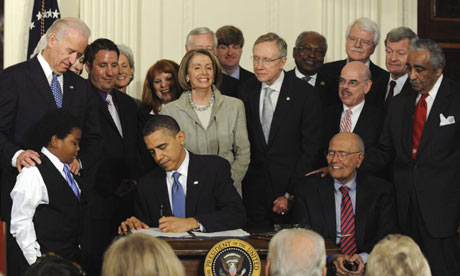
Healthcare for all Americans has been one of Barack Obama's key goals in his two years as president so far. That signature achievement hangs in balance because of a host of lawsuits launched by Republican politicians, which are starting to gain traction in the courts.
"The bill I'm signing will set in motion reforms that generations of Americans have fought for and marched for and hungered to see," Obama said when he ceremonially signed the Patient Protection and Affordable Care Act into law on 23 March 2010, claiming that it enshrined "the core principle that everybody should have some basic security when it comes to their healthcare."
In reality, of course, the healthcare act – derisively called "Obamacare" by opponents – is based on the idea that this basic security is to be provided by private healthcare companies that get to charge hefty fees to most citizens who are now required under the law to buy health plans. (The healthcare companies in turn would no longer be allowed to deny coverage to patients with existing health problems.)
These companies initially fought the original healthcare bill, which would have allowed for a public healthcare plan option, but threw their weight behind the new legislation after cutting a deal with the White House to make sure that they could profit from 50m potential new customers when the public option was gutted. (Since many of the uninsured are young and healthy, the healthcare companies stand to make a tidy profit. The less-than-healthy get to buy insurance from government regulated insurance pools.)
Earlier this week, Henry Hudson, a Virginia judge, ruled that it was unconstitutional for the government to compel Americans to buy health insurance. Legal experts predict two years of bitter courtroom battles, with the issue reaching the supreme court. Now that the healthcare act has been thrown into turmoil by the ruling, it will be interesting to see what the healthcare companies will do. Will they throw their weight behind the Republicans, who plan to spend 2011 and 2012 repealing "Obamacare", or will they back the president?
The latest political spending data suggests that the healthcare lobby mostly supported Democrats in the 2010 election. With the House of Representatives now controlled by Republicans, the insurance companies are starting to worry that they may lose their access to new young and healthy customers and be forced to simply provide coverage to unhealthy people. "It's absolutely the worst possible outcome," one former White House official told the Wall Street Journal.
Lost in this brouhaha of whether or not the government can force US citizens to buy health insurance or not is the fact that many of the biggest players in the healthcare industry make billions not just from providing healthcare, but also from fraud, waste and abuse of existing government mandated programmes. Every year, giant pharmaceutical and insurance companies are some of the primary players in an estimated $60bn ripoff of the two biggest healthcare programmes in the country – Medicare and Medicaid – which support the old and the poor in this country.
Part of the problem is the staggering sums involved: the US spends about $753bn in taxpayer dollars, or 5% of GDP, on Medicare and Medicaid, which, in turn, have become a gold mine for the private companies that provide the care. (An interesting statistical note: given that the NHS costs UK citizens roughly 5% of national income, the money spent on Medicare and Medicaid would be sufficient to provide British-style healthcare to everyone in the US.)
A quick scan of the official press release index of the department of justice suggests that it is a rare week when the authorities fail to catch someone who has milked the taxpayer for $10m or more. Just last week, three companies – Abbott Laboratories, B Braun Medical, and Roxane Laboratories – agreed to pay $421m to settle allegations of overcharging. (The companies were billing the government up to 20 times more than the actual consumer costs for products like intravenous drugs and solutions.) In the last two years, the state of Massachusetts alone recovered $4bn in civil and criminal healthcare fraud settlements – notably, with a single $2.3bn judgment against Pfizer.
The next challenge to the healthcare bill is to be presideded over by Roger Vinson, a judge who was appointed by Ronald Reagan. Ironically, the case will be heard in Florida, which is about to inaugurate a new governor – Rick Scott, a Republican who made his money in the healthcare business, until he was forced to resign in a Medicare fraud case brought against Columbia/HCA, which was the world's largest healthcare company at the time. Scott was not indicted in the scandal and has protested that he never condoned any illegal activity. He is no friend of the healthcare law, though – raising $20m to fight the bill, including $5m of his own money.
Whatever the final outcome of the healthcare debate is, I'd be willing to wager good money that the healthcare companies will come out on top.

